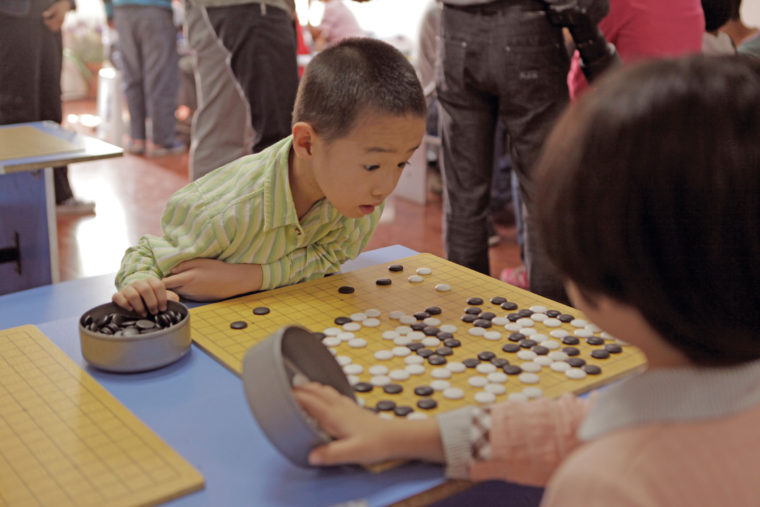At age 6, Cole Pruitt received a book full of mind games, one of which was a version of the strategic board game Go. Fifteen years later as an undergraduate at Brown University, Pruitt was reintroduced to the game when he began playing it online. Shortly after, he joined his university’s Go club.
“That was it. I was in the flow,” Pruitt says. “The more I learned, the harder it got, and that was the opposite of every other game I’d ever played.” Though simple to learn, Go, a game played with black and white stones on a 19-by-19-inch grid, takes years to master. Two players take turns placing stones on the intersections of the grid, trying to enclose the most space on the board.
“These rules are just as abstract as you can get, so there’s an immense degree of depth that comes with it,” Pruitt says. “It’s one of the last remaining strategy games that computers cannot beat.”
Today, Pruitt, a graduate student in chemistry in Arts & Sciences at Washington University, is turning the game he describes as “endlessly engaging” into a documentary. The Surrounding Game will give both trained Go players and viewers who are unfamiliar with Go access to the game’s rich history. It’s been popular in China, Japan and South Korea for thousands of years but has not caught on outside of East Asia.
“It’s taken people physically moving outside of borders for the game to spread,” Pruitt says. He cites cultural barriers including language and conventional knowledge as reasons the spread of Go to the United States has been limited. He says he hopes The Surrounding Game will help tell “a 3,000- year-old story that needs to be told.”
Pruitt’s co-director, Will Lockhart, whom Pruitt met through the Brown University Go club, first approached him with the idea of creating a Go documentary around the time that the United States launched its first professional Go system, the American Go Association. Despite having little knowledge of documentary filmmaking, Pruitt knew this was the perfect time to tell the story of Go.
The pair received funding through the Ing Chang-Ki Wei-Chi Education Foundation, which supports the growth of Go, to film a three-minute trailer that sparked interest in the documentary. Lockhart and Pruitt later launched a Kickstarter campaign to fund the project.
The film took Pruitt across the United States and to China, South Korea, Japan and Canada. While filming in Japan, the crew gained access to the Yugen-no-ma, “the room of mysteries and depth.” The room, floored in tatami mats and decorated with traditional Japanese calligraphy, was constructed in the Nihon Ki-in, the national Japanese Go center, for special top-level title match play. It is widely considered to be the most respected room in the world of Go.
“There’s a connection in Go to history and other people that’s really amazing to me.”
Cole Pruitt, graduate student in Arts & Sciences
Pruitt believes he and his crew were able to gain access to places normally off-limits “because very rarely would somebody from the West be interested in this at all,” he says. The crew capitalized on its novelty.
During his visit to South Korea, Pruitt interviewed world-renowned Go player Lee Sedol with the help of a translator. Despite the language barrier, the two found they had a lot in common simply because of their shared passion for Go.
“There’s a connection [in Go] to history and other people that’s really amazing to me,” Pruitt says.
According to Pruitt, the film reveals a lot about the relationship between the United States and other cultures. It shows the intellectual and cultural
values of the United States in comparison to those of East Asian countries.
While he was working on the film, Pruitt put his chemistry studies on hold until fall of 2013 when he started at Washington University. Friends told Pruitt that the change from film to physical science would be drastic, but Pruitt sees similarities between directing and chemistry.
“Both of them are about taking a complex problem and trying to solve it,” he says. “I don’t need to change gears to move from one to the other. They both feel like they’re natural extensions.”
Pruitt even sees possibilities for combining his passion for film and physical science in the future. For now, he is in the process of starting a campus Go club that will be open to players at any level.
Pruitt and his team plan to complete the film in late 2015 and premiere it at a major North American film festival in early 2016. “When you deeply love something, you’ve got to tell people about it,” Pruitt says. “It’s just something you want to share with other people.”
Go to surroundinggamemovie.com for more information.
